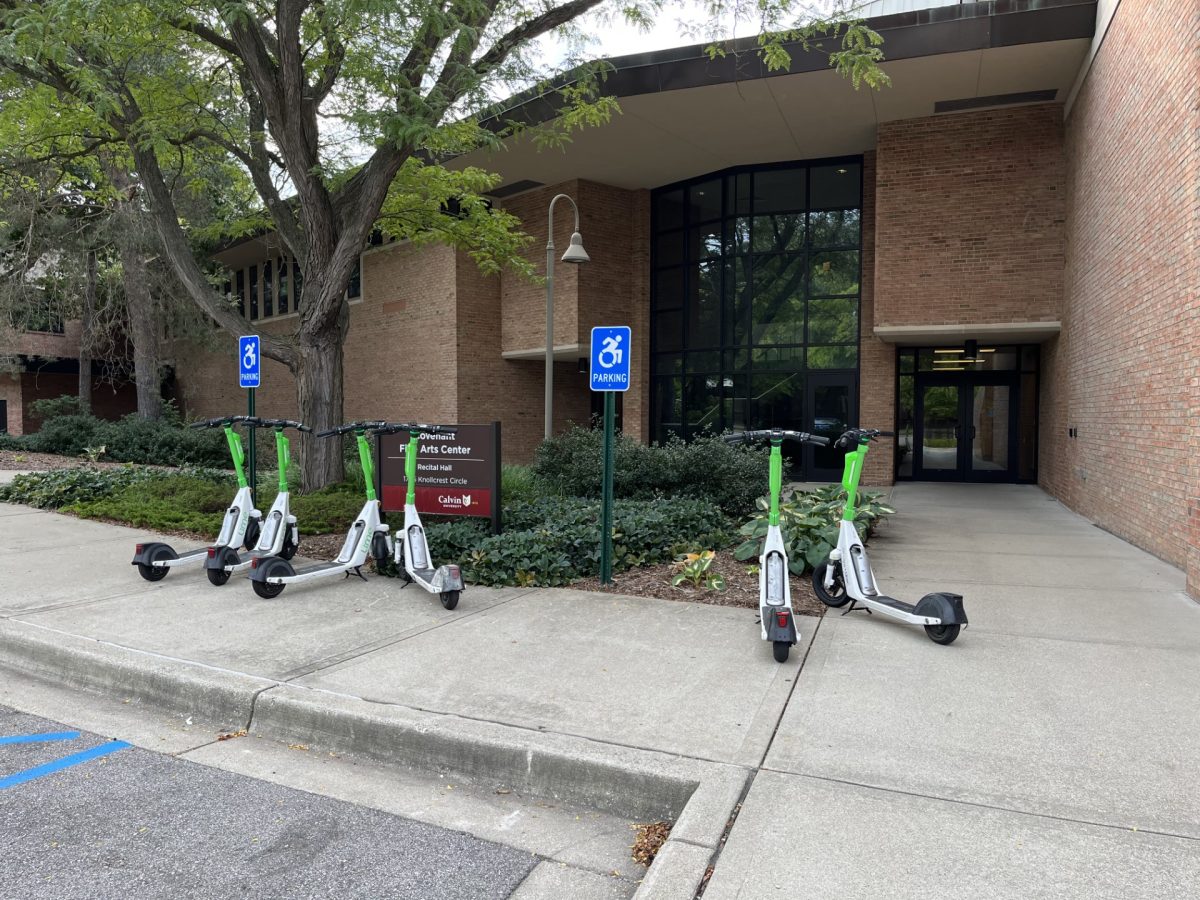This fall, Calvin has partnered with Lime to offer electric scooter rentals. However, the scooters have caused some difficulties as users make inappropriate parking choices.
According to JB Britton, associate dean of campus involvement and leadership, the goal of the scooters is to “provide opportunity for relatively inexpensive transportation for students,” especially out-of-state and international students for whom bringing their own bike is “more challenging.” Although the scooters offer faster on-campus transportation and recreation, improper parking has also made them a potential barrier.
Calvin has a “long history” of offering bike and scooter-sharing programs, according to Britton. About a decade ago, Calvin started its own bike-share program. When this proved unrealistic, they began a partnership with Spin, Lime’s rival. At the time, both companies were “competing for a contract” with the City of Grand Rapids, said Britton. After Lime got the contract, Britton said Calvin “decided strategically…to see if we could have a partnership with Lime.”
The scooters currently have a “limited scope” where they can operate, but Calvin is “working with the city of East Grand Rapids” to connect the campus and the city’s systems, according to Britton.
“We think students would like to go to Reed’s Lake, like to go to Jersey Junction, like to go to some of those things right through to go out for breakfast in Eastown,” said Britton.
Internationally, e-scooters — including Lime’s — have provoked some controversy. According to the Chicago Sun-Times, Lime reported offering 1 million rides in Chicago this past year; Lime is one of three companies with a license to rent scooters in Chicago. However, on Sept. 1, Paris implemented a ban on e-scooter companies due to concerns about safety and reckless driving, NPR reported.
On Calvin’s campus, inappropriate parking of e-scooters has been an issue. Britton said he has “been a little disappointed in where students have been choosing to park these things.” Lime scooters have designated parking areas, and people can get fines if they don’t park in these areas. However, the geofencing — which shows users where these parking areas are through the Lime app — is “not as precise as what we were hoping,” said Britton, and some users have chosen to park in inappropriate locations, including in or around handicapped parking spaces for cars.
These parking choices disproportionately impact students, faculty, staff and others on campus with disabilities, according to Kevin Timpe, professor of philosophy, whose area of scholarship includes disability studies.
“Parking a scooter in front of a building door blocks access for others, which can be especially difficult for folks with mobility or vision impairments, and parking in an accessible spot is a violation of the law,” said Timpe.
Britton said he’s been moving scooters and “encouraging some administrators to do the same.” Thomas Vandermeer, a junior studying biochemistry, said he’s had to move some scooters as well and that “it’s a hassle to move them to get into buildings.”
According to Britton, Lime has started to hand out warnings, and he thinks he has seen “a little bit of improvement over the past week.” Britton also said that Calvin has posted signs and taped off areas to make it clearer where scooters should be parked.
“With a labeled area taped off, we hope students will [not only be] like, ‘Oh this is a spot,’ but also like, ‘Oh, that’s actually The Spot,’” said Britton.
Vandermeer suggested “minimizing the amount of scooters on campus” as a potential additional strategy to prevent improper parking “because less of them would entail less of them being the way.”
Unlike some other modes of transportation –– such as personal bicycles –– Calvin itself does not hand out warnings or fines for improperly parked Lime scooters, and Calvin does not know which students have parked improperly.
“Any sort of warnings or fines comes through the Lime process and is beyond Calvin,” said Britton.







